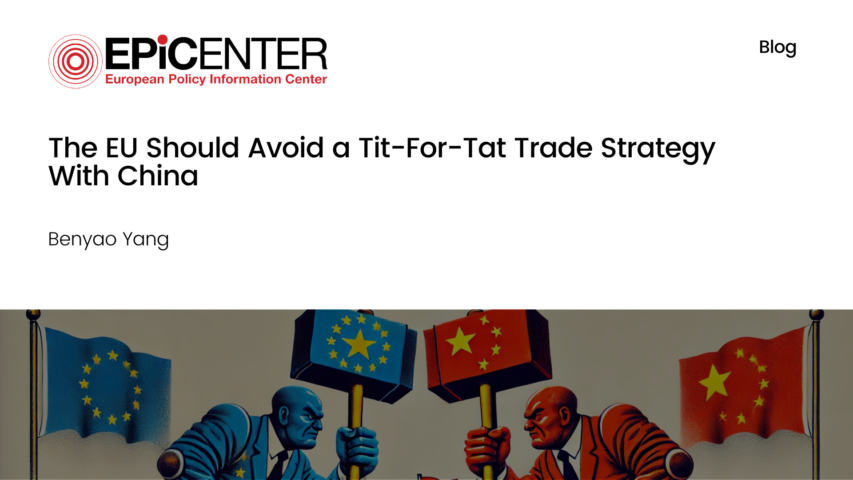The EU Should Avoid a Tit-For-Tat Trade Strategy With China

The EU Should Avoid a Tit-For-Tat Trade Strategy With China
Benyao Yang // 12 September 2017
On 13 September, the European Commission’s President, Jean-Claude Juncker, is set to deliver his 2017 State of the Union speech. Whilst Mr Juncker wants to use this speech to push for greater EU integration, he is also reported to call for tougher controls over Chinese investments in Europe.
At the end of July, France, Germany and Italy requested Brussels to play a bigger role to restrict (and eventually to block) Chinese investments. As the EU’s “Big 3” argue in their letter to the Commission, the recent rise of Chinese takeovers in Europe’s strategic industries is not driven by market forces, but primarily by mere geo-political interests. In May 2015, China launched its latest high-tech revolution: the so-called “Made in China 2025 strategy”. This political master plan was initiated by incumbent Premier Li Keqiang with the aim to turn China into one of the leading industrial countries by 2049.
Looking at China’s most recent commercial history, the surge in Foreign Direct Investment (FDI) outflows began in the late 1990s when Beijing introduced the “Go Out” policy. This strategy was strengthened in 2013, when President Xi Jinping launched the “Belt and Road” initiative. The main idea behind Mr Xi’s grand project is to connect Europe and China’s capital markets and it involves China underwriting billions of dollars of infrastructure investment in nearly 70 countries.
As of 2017, China has become the world’s second-largest source of outward FDI. This has been driven by a dramatic increase in cross-border mergers and acquisitions by Chinese State-Owned Enterprises (SOEs). China is now Europe’s second largest trading partner and according to a recent report by Ernst & Young, in the first six months of 2016, China invested more than $70 billion in European companies, or as much as in 2013, 2014, and 2015 combined.
In order to avoid any potential tit-for-tat strategy with the EU, on 18 August, China’s State Council released guidelines to regulate “irrational” overseas investment. Thus, if the EU decides to go ahead with its protectionist plans against Chinese takeovers, Beijing is likely to retaliate. Whilst Germans will go to the polls on 24 September, the Chinese Communist Party will open its 19th Party Congress on 18 October. Thus, a call for more restrictions over Chinese investments might backfire badly. Restrictions on trade and foreign investment often harm the very people who the government endeavors to protect. In fact, protective measures produce narrow benefits for a few whilst imposing costs on many.
The EU and China launched negotiations for a Bilateral Investment Treaty (BIT) in 2013 and the 14th round of negotiations was held in Brussels on 11-14 July. So far, little progress has been made, mainly because of diverging interests amongst EU Member States. On the one hand, France, Germany and Italy are willing to reduce China’s investments in the EU by introducing a mechanism to screen Chinese FDI. On the other hand, following the 2015 “16+1 platform” cooperation agreement with China, Central and Eastern European Member States hope to further increase their ties with Beijing.
As a well-known Chinese proverb about Sino-Japanese relations goes: “He Ze Liang Li, Dou Ze Ju Shang” (in English: “Both will benefit from a harmonious relationship, or will get injured because of conflict”). This saying is also applicable to today’s EU-China trading relations. Back to the late 1970s, the “Four Modernisations” enacted by Deng Xiaoping were greatly supported by foreign technology transfer – including that of European countries – through joint ventures. With China now moving into its next phase of economic development, it would be more realistic for European countries to think about the benefits of stronger trading ties with Beijing rather than employing a protectionist approach. According to a 2016 study by Bruegel, China’s “Belt and Road” initiative is likely to bring massive opportunities for the EU, which could see trade rising by more than 6%. This would undeniably lead to stronger business activity, higher growth and job creation all across the Union.
As of 2017, Brussels has 44 trade agreements in place with more than 60 countries across the globe. However, when it comes to the Union’s five largest extra-European trading partners, the situation looks blurrier. The EU does not have a FTA with the United States; it has imposed heavy sanctions on Russia (total trade with Russia declined by 33% between 2014 and 2016); it has a very old customs union agreement with Turkey; and it reached a political agreement with Japan over a comprehensive trade deal just two months ago. Based on these facts, a EU-China investment agreement can play a decisive role in the future growth of the Union’s economy. In 2016, the EU total trade with China equated to 14.9% of its total. Brussels and Beijing trade on average over €1 billion every day.
If Mr. Juncker wants to be remembered as the man who charted the path forward for Europe, he should remind the French, the Germans and the Italians that the EU is open for business. In fact, protectionism is not a path to prosperity but, instead, a sure-fire recipe for economic stagnation.
EPICENTER publications and contributions from our member think tanks are designed to promote the discussion of economic issues and the role of markets in solving economic and social problems. As with all EPICENTER publications, the views expressed here are those of the author and not EPICENTER or its member think tanks (which have no corporate view).



